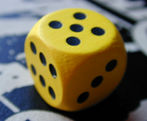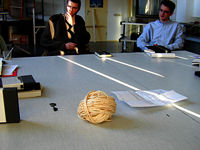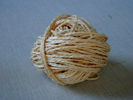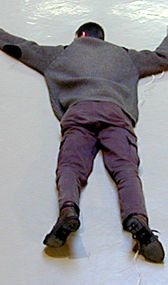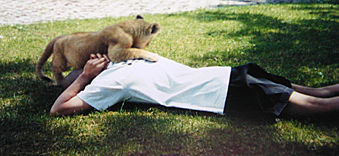|
|

|
|||||||||
|
|
Present Past Subjects Projects Misc |
DECEMBER 1999
Back From Paris Note to myself: When I've got a lot to say (for example about our recent adventures in Paris) but feel pressed for time (there is always *so much* to do) -- I end saying and doing nothing at all and feeling more the worse for it. Not a good thing... What to do about this? Is there a lesson to be learned here? More to follow... Drinking tea No. 2307 (Pai Mu Tan) from Mariage Frères. Everything or Nothing II Spent part of the day cleaning up. Part of the day in a meeting in the city. Part of the day reading recent posts (courtesy of Deja.com) on rec.food.drink.tea. Incredible what some connoisseurs can find to say about their tea. Tasting the Wenshan Wulong. Tough luck with Darjeelings. Confession
At the bedside of Master Breton.
Classification Hierarchy Longer is better...
Footnote: According to the rec.food.drink.tea FAQ one of the readers of the newsgroup "was under the impression that the acronyms TGFOP and FTGFOP stood for 'Too Good For Ordinary People' and 'Far Too Good For Ordinary People.'" Footnote: The appellation 'Orange' signifies royalty as in the 'House of Orange', while 'Pekoe' is a bastardization of the chinese 'Pak Ho' meaning 'hair or down'. "Now, it is clear that the decline of a language must ultimately have political and economic causes: it is not due simply to the bad influence of this or that individual writer. But an effect can become a cause, reinforcing the original cause and producing the same effect in an intensified form, and so on indefinitely. A man may take to drink because he feels himself to be a failure, and then fail all the more completely because he drinks. It is rather the same thing that is happening to the English language. It becomes ugly and inaccurate because our thoughts are foolish, but the slovenliness of our language makes it easier for us to have foolish thoughts..." George Orwell, Politics and the English Language, 1946. Drinking Namring Darjeeling (90 second infusion). I woke up this morning from a dream where I was flipping through a magazine staring at page after page of art by an old colleague (Berend Strik). Days at the end of an epoch are certainly strange and incomprehensible. How do you fit your daily life (the march of mornings and evenings, the breakfasts, lunches and dinners, the interminable brushing of the teeth, the little orgasms) into such a grand calender? How do you write about it? Net Flotsam Someone named 'Ken' wrote (on a web forum) on 1 May 1998: "I have to write a paper on Beckett's "Endgame". Nothing is resolved in "Endgame." The play just ends. Is this a flaw or does it help Beckett to make his point? What is that point? I appreciate any input that any of you may have. Thanks!" To which someone named 'Lynne' replied on 4 September 1998: "I do not know if you are finished with your paper, but Beckett's work exemplifies minimalism, and this is only one facet of his attempt to express the meaninglessness of everything humans find meaningful, so to speak. Also, there is closure in Endgame to some small degree. Life continues to move on and exist, even if the person or entity in question does not..." Systems Research Rec.games.board thread (May 1999): Another r.g.b. thread (May 1999): The rules to Sauerbaum. (Courtesy Frank Branham's game rules archive.) "The size of the acid rain cloud determines how difficult the game will be. Beginners and children should start with a small cloud of 40 drops. 50 drops is an average challenge, and 60 drops is for the big boys." We talked about tea and drank coffee. JK squeezed in a brief visit today (between the purchase of a new digital video camera and catching his Thalys 'flight' to Paris). This enabled me to proudly show him my growing games collection and ask his opinion on whether my obsession with exploring 'systems in boxes' made artistically any sense to him. You see, I've been worried about this. Especially since the last couple of weeks have turned into one long lost weekend of reading about board games, hunting them down and buying them (both on the net and off); a case of serious hyper-focality at the expense of all else including this 'web log'. It's been intense and scary. (And for the record: My collection of 'keepers' currently numbers 52 boxes with more than a dozen on the way...) Jouke, thankfully, 'heeft me gerustgesteld' and said that he could appreciate my interest in this area (and even my excesses). Before I took him back to the station we chatted about the beauty of game mechanisms*, systems of self-amendment (Nomic) and the taxonomy of games according to Roger Callois. We even managed to play a quick game of Can't Stop, an absolutely brilliant game designed by Sid Sackson which L. and I recently picked up in Paris, that JK won (although afterwords I found that we had played by the wrong rules!). * Note: Think of an understanding of game mechanisms as a quick path to understanding and designing experiences.
The Franjos edition of 'Can't Stop' (mit seil und würfel!) Saturday afternoon consolation prize: 100 grams of good Keemun and 50 grams of a 'Yunnan FOP Superior'... It's snowing! Rules While researching various dilemmas last summer I came across what I thought was a perfect example of the problem of deciding when to quit and cut your losses in the 'dollar auction', a dilemma discussed in Chapter 9 of J. Keith Murnighan's book Bargaining Games (out of print). Here's a similar, perhaps even better game from another book, Prof. Michael Laver's Playing Politics: The Nightmare Continues. This particular game is called 'Primitive Politics':
It's interesting to read a rule set and try and run the program in your mind. But of course most interesting rule sets defy prognosis and must be played to be understood. You understand that don't you? Natural History Whereby an old friend tells me the oldest secret in the world. n. history, study of animal life, esp. as set forth for popular use, also aggregate of facts about the natural objects or the characteristics of a place or class. state of n., unregenerate condition (opp. state of GRACE), condition of man before society is organized, uncultivated or undomesticated state of plants or animals, bodily nakedness. School in Groningen Academie Minerva. You are in a maze of twisty little passages. Today's McLuhan Seminar was spent reviewing a number of the projects and experiments that the seminar participants are conducting on the 'Roads and Paper Routes' chapter of 'Understanding Media'. My assignment to them had been: 'Try to build a road rather than making a picture of it.' Which is exactly what occurred when one of the participants, Hugo van Noorden, tied the end of a ball of string to one of the legs of the table at which we sat, and without a word of explanation, disappeared (unravelling the string) out the door. When Hugo failed to return after a couple of minutes, what could we do but follow? Tracing the string through a maze of halls and staircases we arrived at a balcony high above the art school's exhibition space. We could go no further -- the string continued over the railing. And peering over the railing we saw, down on the floor below, stilll clutching the string, poor Hugo...
Travel Notes Went down this morning to Arnhem by way of Utrecht and Ede. Jente, who had a meeting in Bussum, accompanied me as far as Utrecht and our conversation along the way made the normally interminable train journey go much faster. In Ede I had arranged to pick up a copy of Alex Randolph's 'Incognito', a long out-of-print game of bluff and deduction, from someone's home. Since I only had a little time I ended up taking a taxi from the station to their house and back. I was a bit disappointed to find the box slightly damaged, but the game turned out to be complete and the damage aside, I was happy to get it. School in Arnhem From Ede I took the train to Arnhem and the art school there. This afternoon I played the part of 'extern deskundige' (external expert) at the mid-term critique of 4 students who are hoping to do their final exam this year (in June). Nothing too much to note apart from the fact that the discussions got progressively more interesting as the afternoon wore on, culminating in an orgy of post-humanist rhetoric at my end of the dinner table in a local cafe. At a certain moment I was struck by the timelessness of the image. A smoky table of mildly drunken (Dutch) artists, satiated, gestulating and passionate. Some things never change eh? Or as they say in Dutch, 'Altijd hetzelfde liedje...' Prisoner's Dilemma Revisited Damian, from the surreal and excellent Bovine Inversus weblog ("Like most successful web developers, I have a heart felt admiration for men who take animals for their brides."), has sent in the following remarks about last Sunday's Primitive Politics Game: "It would seem to me that a number of people with a certain amount of trust in each other could take advantage of the bank quite easily and make off pretty well. "Say you have 8 good friends that are reasonably intelligent. They put $80 into the pot which is matched by the bank to make $160. They each bid one penny, except for one who bids 2 pennies. The bids stop there, the two penny bidder gets the pot and divides it evenly amongst his friends (which is allowed per rule 7). Of course, it would be stupid for any of the 8 to bid a third penny, as that would start a viscious bidding cycle and they would all end up loosing money (including the winner of the bid). "It would seem to me that even if it were required that the bidders be complete strangers to each other, word would soon get out that the best way to handle such a situation (assuming that the public is made aware of this kind of thing and that everybody has a chance at entering in on a bidding session) would be for all the bidders involved to pick a winner beforehand, and if that winner didn't pay out afterwards, to simply lynch them. "I think the situation could be improved by stating that all bidders must be strangers to each other, and cannot communicate with each other (maybe they could sit in separate booths with computer interfaces) before, during, or after the bidding session." The key, of course, to Damian's solution to the bank's perfidious auction is the 'trust' that the colluding bidders would 'not bid'. But what to do if a 'stranger' gets greedy? Can we expect those 'in the know' to walk away losing their investment of $10.01? Le Grand Meaulnes Thus, little by little, the trail became a maze, and the one thread that attached him to those he had left was broken. Game Theory Duen Hsi Yen's Game Theory Page is an inventory of (your favorite) games, dilemmas and traps... Geloof, Hoop en Liefde. Y2K Writ Large commensurable, a. Measurable by the same standard (with, to); (of numbers) divisible without remainder by the same quantity; proportionate to. I believe: ...that (the length) of our lives is incommensurable with the length of the millenium. I hope that that may change. I also believe: ...that our lives are far too commensurable with the various pulp patterns, pulp folklore and pulp love songs that compose our world. I hope that that may change as well. Y2K Writ Small JK sent me an email this morning that the Beuvron (the little river that could...) was on the rise and flowing merrily through his cellar. "Water entered the house this morning at 7:30 in the cellar where it started surfacing in the middle of the floor. Now it comes in at the front and leaves at the back, millside." And here, in my own house, there has been a Great Unrest of the private, hidden sort. A personal catastrophe for which there is no insurance. An inquietude which is impossible to talk about. (I don't dare, for it may make it more true than necessary.) It may be that what has happened is about commensurability. But I'm not sure. (All I know is that the big lump that has stuck in my throat for the last two days is no cancer...) Tooth and Nail
It was a June afternoon in Vilnius Lithuania in 1995. There I was playing with Simba, the lion cub that JK and I borrowed for our 'Kiosk de Combat/Safe Haven' project and my tee-shirt was torn. Simba, although still a baby, had very sharp claws and the instinct to use them.
Lying in bed surrounded by closed books... ... staring at the ceiling and thinking of the story of Damocles -- I conjure up the illustration from the book I had as a child, the arabesque of light and dark, Damocles reclining on his couch, his face horror-filled, uplifted. The sword a glint. The thread a shadow. The Future State of Health "Diseases are. We do not make them or unmake them at will. We are not their masters. They make us, they form us. They may have even created us. They belong to this state of activity which we call life. They may be its main activity. They are one of the many manifestations of universal matter. They may be the principle manifestation of that matter which we will never be able to study except through the phenomena of relationships and analogies. Diseases are a transitory, intermediary, future state of health. It may be they are health itself." Blaise Cendrars, Moravagine. 1925. News Item How oddly fate's bell tolls on the eve of the millenium... Sarah Knauss, the 119-year-old woman who was listed as the world's oldest person in the Guinness Book of Records, died Thursday, according to a spokeswoman at the Allentown nursing home where she lived. Knauss, who was 28 when Henry Ford introduced the Model T in 1908, apparently died of natural causes at about 3 p.m., said Marcella Moyer Schick, executive director of the Pheobe-Devitt Homes Foundation. "She died quietly in her room. She was not ill," she said. "They had stopped in to see her just less than an hour before, and when the nurse went back, she had passed away."
ALAMUT.COM is privately owned and operated Feedback: feedback@alamut.com Last modified: 8/1/00; 10:47:51 CET |
|
|||||||



